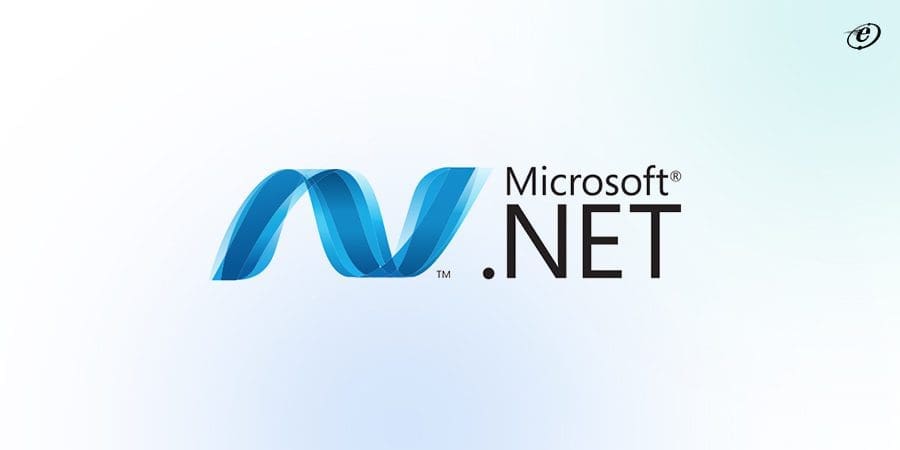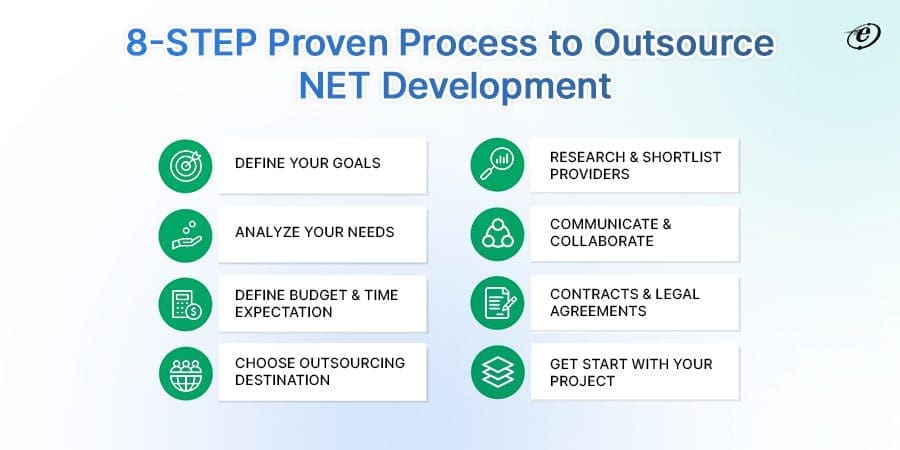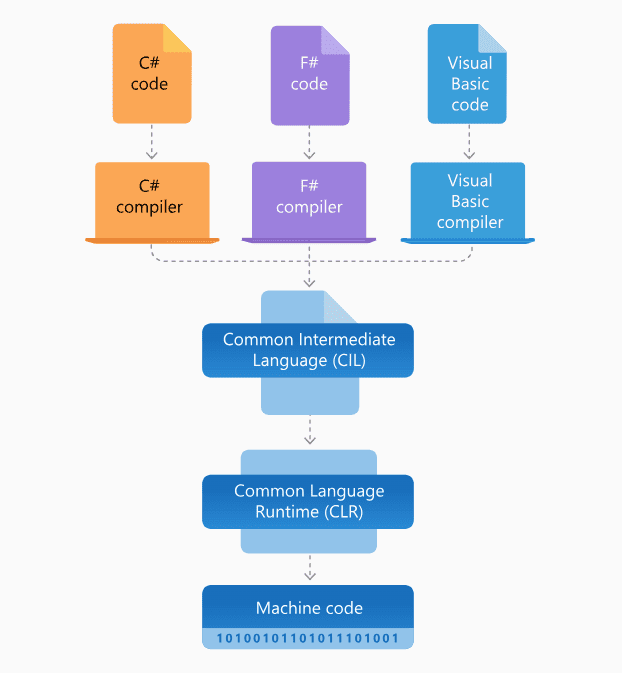
Outsource Net Development: A Complete Guide 2025
Do you also want to avoid the tiring and lengthy process of outsource net development for your next project?
If yes, you are in the right place!
This comprehensive guide on when, why and how to outsource NET development will help you understand the nitty-gritty of outsourcing the right talent from the right location.
Outsourcing is the practice of delegating specific tasks, projects, or business processes to external individuals or companies, often located in different regions or countries. This is done to leverage specialized expertise, increase efficiency, reduce costs, and focus on core activities while benefiting from external resources.
According to Statista, NET is used by 16.57% of developers worldwide as of 2023. Are thinking, why is this technology loved worldwide, and why are businesses looking to outsource ASP.NET or .NET developers?
The reason is that NET offers robust security, cross-platform capabilities, a vast library ecosystem, seamless integration with Microsoft technologies, and excellent support for building scalable and modern applications across web, desktop, mobile, and cloud environments.
Industry verticals where Net is being used (Source: SimilarTech)
| Industry | Popularity |
| Finance | 3.39% |
| Law & Government | 3.340% |
| Computers Electronics & T | 4.95% |
| Science & Education | 6.05% |
| Others | 82.21% |
Keeping up with the most recent trends on such a large platform may be challenging for internal staff, mainly if your goal is to stand ahead of your competitors and grow your business.
You might not get the result you had in mind if you don’t have access to qualified and seasoned developers. But if you outsource from top offshoring companies, you can achieve your desired goals easily.
Let’s find out why organizations prefer the NET framework, how .NET development outsourcing may help them achieve their objectives, and how to outsource NET development.
Before that Let’s first explore why you should outsource .NET development.
When should you Outsource .NET Development?
Outsourcing .NET development can be a strategic decision in various scenarios. The following are some of the situations where outsourcing is the best solution.
- Expertise Gap: Outsource .NET development when your in-house team lacks the required expertise in .NET technologies for the project.
- Scalability Needs: Consider outsourcing if your project demands rapid scalability or a quick ramp-up of development resources, allowing you to adjust team size flexibly.
- Cost Efficiency: Outsource when looking for cost savings on development, mainly when collaborating with teams in regions with lower labor expenses.Global Talent Access: Leverage outsourcing to tap into a vast pool of skilled developers worldwide, providing access to diverse talents and experiences.
- Complexity Alignment: Choose outsourcing when the complexity of your project aligns with the vendor’s capabilities, ensuring a smooth and efficient collaboration.
What is NET or ASP. NET?

The Microsoft-created.NET Framework is a software development framework that offers a runtime environment, a collection of libraries, and a range of tools for developing and running applications on Windows-based operating systems. The framework supports various desktop, web, mobile, and gaming applications.
Architecture of .NET Framework
The.NET platform is a piece of software that can do the following functions:
- Convert the code of the.NET programming language into instructions that a computer can understand.
- Make tools available for effective software development. It can, for instance, determine the time or print text on the screen.
- Define a collection of data types for the computer to store information such as text, numbers, and dates.
ASP.NET is a web application framework developed by Microsoft as part of the .NET platform. While “.NET” is a broader framework that supports various types of applications (web, desktop, and mobile), “ASP.NET” focuses explicitly on building web applications and services.
When you hire .NET developers, they bring proficiency in Microsoft technologies, frameworks, and tools, accelerating development, improving user experiences, and contributing to the success of your software projects using the mind-blowing features of this framework.
Let’s cover all the significant features of this framework that entices enterprises worldwide to outsource NET development.
Major Features of NET Framework

The .NET Framework is a comprehensive and versatile platform that facilitates the creation of a wide range of enterprise applications, from web and desktop to mobile and cloud-based applications. Here are some key features of the .NET Framework:
-
Common Language Runtime
The CLR is at the core of the .NET Framework, which provides an execution environment for managed code. It offers features like memory management, security, exception handling, and automatic garbage collection, enhancing application robustness and stability.
-
Cross-Language Interoperability
A program’s capacity to communicate with another program written in a different programming language, regardless of its originally developed language, is known as language interoperability. The dedicated .NET developers found that the development process can be more productive overall, and code reuse can be maximized with language compatibility.
-
Great Debugging Support
The.NET IDE (integrated development environment) may provide quick and comprehensive debugging support. This implies that whenever an exception occurs while an application is running, the program terminates. The IDE flags the offending code line along with any additional faults that may have occurred.
-
Extensive Third-Party Libraries
The .NET ecosystem boasts a vast collection of third-party libraries and packages available through NuGet, enhancing developer productivity by providing pre-built solutions for various tasks.
-
Security & Performance
The .NET Framework offers various security features like code access security, role-based security, and cryptography libraries. It includes performance optimization tools like Just-In-Time (JIT) compilation and native image generation.
Explore how to boost the performance of your .NET application quickly.
-
Portability
The portability feature of the .NET Framework enables applications to run on different platforms, such as Windows, Linux, and macOS. With the introduction of .NET Core (now merged into .NET 5+), developers can create applications not tied to a specific operating system, promoting code reusability and deployment flexibility across diverse environments.
Why Outsource NET Development for your Next Project?
NET development Outsourcing for your next project can bring several significant advantages, ranging from cost savings and access to specialized expertise to enhanced scalability and faster time-to-market. Here are compelling reasons to consider outsourcing .NET development:
-
Expertise & Experience

As we know, technology is constantly evolving. Therefore, your development team must stay current with advanced technologies. An in-house development team would necessitate training or mentoring, increasing expenses and delays. Many outsourcing companies specialize in .NET development, providing you with access to experienced professionals who are well-versed in technology. They keep up with the latest trends, best practices, and updates, ensuring your project benefits from their knowledge.
-
Cost Effective

When you outsource NET development, tap into the talent pool of skilled developers in regions with lower labor costs. This can result in considerable cost savings compared to hiring an in-house team, as you’ll be able to access top-notch expertise at a fraction of the cost.
Check out the offshore development rate by country in 2023.
-
Faster Time-To-Market

There is no denying that the early bird gets the revenue worm in the corporate world. Rapid application development and deployment are essential for capturing a sizable portion of the market.
When you outsource NET development, it can accelerate your project’s development timeline. With a skilled team already in place, you can avoid lengthy recruitment processes and get your product to market faster, gaining a competitive edge.
-
Wide Talent Pool

The NET framework is a collection of several programs, libraries of code, and programming environments. If you choose the in-house route, you must hire software engineers with various domain specialties to leverage the framework. But when you outsource NET development services to a dedicated agency, you may access a large talent pool ready to deliver immediately.
-
More Focus on Core Business

NET development outsourcing enables you to concentrate on your core business operations while leaving the technical details to professionals. This may result in increased productivity and effectiveness in your business operations.
.NET developer outsourcing will take on the duties involved in the development and deployment of the web and mobile applications, freeing up important corporate resources for you to use in expanding your main business.
-
Dedicated Support

Many outsourcing companies offer ongoing support even after the development phase is complete. This ensures that your application remains updated, secure, and fully functional. With .NET development outsourcing, you can have the professionals there make changes to the product in addition to receiving it as you intended.
How to Outsource NET Development effectively? – Step-by-Step Process
.NET development outsourcing can be a strategic decision to leverage external expertise, reduce costs, and accelerate project timelines. To ensure a successful outsourcing experience, consider the following steps:

STEP 1: Define Your Goals
It’s crucial to understand the need for outsourcing. As more you have clarity on what you want to achieve through .NET development outsourcing, more specifically, you can convey your requirements to the outsource/offshore firms.
What do you need to define?
- Desired output
- Gaps you aim to fill by outsourcing
- Task you want to delegate
- Budget restrictions
STEP 2: Analyze Your Needs
Now, clearly define your project’s objectives, scope, features, and technical requirements. A detailed project brief will help potential outsourcing partners understand your needs accurately.
Besides this, based on your immediate goals, you will decide on the outsourcing strategy. The two most used models of outsourcing are:
Project-based outsourcing: It involves hiring external teams to complete specific projects or tasks within a defined scope. It offers flexibility and cost control for short-term needs.
Specialized model outsourcing: It focuses on engaging expert teams with specific skills, often for ongoing or complex projects. This approach provides in-depth knowledge and long-term support for specialized areas, ensuring high-quality results.
Project Based Model vs Specialized Model
| Aspect | Project Based Outsourcing | Specialized Model Outsourcing |
| Duration | Temporary, project-specific engagement | Long-term, sustained collaboration |
| Best For | Short-term needs, limited resources | Complex projects requiring specialized skills |
| Cost | Fixed | Flexible (Monthly or Hourly) |
| Management | Vendor | Client |
| Expertise Required | General skills for specific tasks | Deep expertise in specialized areas |
STEP 3: Define Budget & Time Expectation
At this stage, defining budget and time expectations is crucial for cost control, resource planning, and project efficiency. It promotes transparency between you and the outsourcing partner, aids in vendor selection, and ensures realistic timelines.
Clarity on budget prevents unforeseen costs, while time expectations prevent unrealistic deadlines, aiding project management and risk mitigation. This practice aligns both parties, streamlining project scope, fostering better communication, and ultimately leading to successful project outcomes.
STEP 4: Choose Outsourcing Destination
Choosing the best outsourcing location involves carefully evaluating various factors to ensure a successful partnership. The .NET development outsourcing location must align with your project’s specific requirements, providing a balance between cost-effectiveness, skill availability, communication, and other crucial factors. Below are some essential factors you should consider.
| Skill Availability | Assess the pool of skilled professionals in the location. Look for regions with a strong talent base in the required technology or domain, such as .NET development. |
| Language and Communication | Language proficiency is vital for effective communication. Choose a location where the workforce is proficient in languages you commonly use, ensuring smooth collaboration. |
| Cultural Compatibility | Similar work cultures and values can enhance collaboration and reduce misunderstandings. Cultural alignment supports effective teamwork and project understanding. |
| Legal and Data Protection | Research the location’s legal and data protection frameworks. Ensure they align with your compliance requirements to protect sensitive information. |
| Cost Efficiency | Consider regions with lower living and labor costs. Compare rates for skilled professionals in potential locations to ensure cost savings without compromising quality. |
| Infrastructure and Connectivity | Ensure the chosen location has reliable infrastructure, including power, internet connectivity, and technological resources required for seamless remote collaboration. |
STEP 5: Research & Shortlist Providers
Research and identify potential outsourcing partners with a strong track record in .NET development. Look for companies with relevant experience, a solid portfolio of similar projects, and positive client reviews. Shortlist a few candidates that align with your project’s goals.
STEP 6: Communicate & Collaborate
Assess the expertise of each shortlisted provider. Look for developers skilled in the specific .NET technologies and frameworks your project requires. An experienced .NET developer ensures the quality and efficiency of your project.
Moreover, effective communication is crucial for successful outsourcing. Evaluate the communication channels and tools the providers use. Clear and regular communication, often through video conferencing, chat, and project management tools, will help keep everyone aligned.
STEP 7: Contracts & Legal Agreements
Once you finalize the outsourcing partner, draft a comprehensive contract that outlines project scope, deliverables, timelines, payment terms, and intellectual property rights. Having a legally binding agreement protects both parties and ensures everyone is on the same page.
STEP 8: Get Start with Your Project
Once you get into agreement, the dedicated .NET developers join your team and start working on the project. To build trust and assess the outsourcing partner’s capabilities, consider starting a smaller pilot project before committing to a larger one. This allows you to evaluate their work quality, communication, and adherence to timelines.
Maintain a feedback loop throughout the development process. Regularly review the progress, provide feedback, and address any concerns promptly. This collaborative approach ensures alignment and minimizes potential misunderstandings.
Cost to Outsource Net Development

The cost to outsource NET development can differ depending on factors such as the scope, the project’s complexity, the outsourcing provider’s location, and the expertise required. Average rates can range from $20 to $150+ per hour, with lower costs in regions like India and higher costs in the United States or Western Europe.
Find the offshore software development rate by country in 2023.
Small projects might start at a few thousand dollars, while larger and more complex projects could cost tens of thousands or more. Obtaining quotes from multiple outsourcing providers and discussing your project’s specifics is recommended to get a more accurate cost estimate. Check out the developer’s hourly rate in different countries in the table below.
Cost to Outsource NET Development in Different Countries
| Country | Hourly Rate |
| United States | $120-$150 |
| Australia | $110-$130 |
| United Kingdom | $100-$120 |
| Western Europe | $80-$100 |
| Eastern Europe | $40-$70 |
| Philippines | $30-$40 |
| India | $20-$35 |
Factors to Consider while Outsource . NET Development
Outsourcing .NET development can bring numerous challenges along with benefits, but it’s essential to be aware of potential challenges and have strategies in place to address them:
-
Communication Barriers
Remote teams might face language barriers, time zone differences, and miscommunication. Therefore, we must establish clear communication channels, use project management tools, and set regular update meetings to bridge gaps.
-
Quality Control
Ensuring consistent code quality and adherence to project standards can be challenging. Thus, we need to implement a robust testing and quality assurance process, define coding guidelines, and conduct regular code reviews.
-
Cultural Differences
Differing work cultures can affect collaboration and understanding. Hence encourage open discussions about cultural norms, expectations, and work practices to create a harmonious working environment.
-
Scope Creep
Poorly defined project scopes can lead to scope creep and delays. Therefore, we must establish a detailed project scope and change management process, ensuring that any scope changes are documented and approved.
-
Data Security
Outsourcing involves sharing sensitive data. Hence choose outsourcing partners with robust security measures, employ encryption, access controls, and compliance with data protection regulations.
-
Time Zone Differences
Working across time zones can lead to delays in communication and decision-making. Thus, find overlapping hours for real-time collaboration and use asynchronous communication tools for seamless coordination.
Outsource NET Development: Potential Challenges with Expert Solutions

Outsourcing .NET development can bring numerous challenges along with benefits, but it’s essential to be aware of potential challenges and have strategies in place to address them:
-
Communication Barriers
Challenge: Remote teams might face language barriers, time zone differences, and miscommunication.
Solution: Establish clear communication channels, use project management tools, and set regular update meetings to bridge gaps.
-
Quality Control
Challenge: Ensuring consistent code quality and adherence to project standards can be challenging.
Solution: Implement a robust testing and quality assurance process, define coding guidelines, and conduct regular code reviews.
-
Cultural Differences
Challenge: Differing work cultures can affect collaboration and understanding.
Solution: Encourage open discussions about cultural norms, expectations, and work practices to create a harmonious working environment.
-
Scope Creep
Challenge: Poorly defined project scopes can lead to scope creep and delays.
Solution: Establish a detailed project scope and change management process, ensuring that any scope changes are documented and approved.
-
Data Security
Challenge: Outsourcing involves sharing sensitive data.
Solution: Choose outsourcing partners with robust security measures, employ encryption, access controls, and compliance with data protection regulations.
-
Time Zone Differences
Challenge: Working across time zones can lead to delays in communication and decision-making.
Solution: Find overlapping hours for real-time collaboration and use asynchronous communication tools for seamless coordination.
Note* By proactively addressing these challenges through clear communication, comprehensive agreements, well-defined processes, and careful partner selection, you can maximize the benefits of outsourcing .NET development while minimizing potential pitfalls.
.NET Development Outsourcing: A Quick Way Towards Success
As discussed, in this write-up, outsourcing provides numerous advantages, including cost reduction through labor arbitrage, access to a global talent pool with specialized skills, scalability to meet fluctuating demands, accelerated time-to-market, and many more.
But all these benefits can be fully leveraged if you outsource NET development from professional and experienced outsourcing firms.
Outsourcing .NET development from leading outsourcing companies assures access to a pool of skilled professionals, efficient project execution, rigorous quality control, and timely delivery. Their established methodologies, communication channels, and security measures reduce risks while enhancing collaboration.
If you are looking for one such organization, meet-eLuminous Technologies, an outsourcing firm that provides a comprehensive solution that ensures high-quality results, minimizes development time, and allows businesses to focus on core activities while benefiting from expert technology solutions.
Let’s connect to learn more about our effective vetting and smooth onboarding processes.
Frequently Asked Questions
How do I ensure the security of my data while outsourcing NET development?
To ensure data security while outsourcing .NET development:
- Sign strong NDAs and data protection clauses in contracts.
- Choose reputable partners with proven security measures.
- Employ encryption for data transfer and storage.
- Implement access controls and regular security audits.
How to find the right outsourcing company?
To find the right outsourcing company:
- Research their experience, portfolio, and client reviews.
- Evaluate their expertise in .NET development and relevant technologies.
- Check if their cultural fit and communication match your needs.
- Ensure they offer secure practices and data protection measures.
- Collaborate on a small project to assess their capabilities before committing.
What is the difference between outsourcing and offshoring?
Outsourcing involves delegating tasks to external parties while offshoring specifically refers to relocating tasks or processes to a different country to take advantage of cost savings or expertise.
Which is best for startups: Outsourced or in-house developers?
Outsourcing can benefit startups due to cost-effectiveness, access to specialized skills, and faster time-to-market. It allows startups to focus on core business aspects while leveraging external expertise. In-house development might be suitable as the company grows and requires more direct control over projects.
How much time does it take to outsource .NET development?
The time to onboard an outsourced developer varies based on the complexity of the project and the developer’s familiarity with the technology stack. Generally, it can take a few days to a couple of weeks for the developer to become fully integrated, understand the project, and start contributing effectively.
At eLuminous Technologies, a leading outsourcing company, you can hire dedicated developers within 24 hours. Let’s connect to know more!





